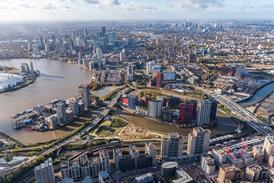Australian bank Macquarie now owns 100% of National Gas, raising questions about the direction and desire of industry to retrofit. The new government must take the lead and industry must get off the fence, says Smith Mordak

If we don’t retrofit the UK’s homes, then the only way to get to net zero by 2050 will be to turn off everyone’s heating. And that is not what I want to be counting down to on New Year’s Eve in 2049!
With Australian bank Macquarie now owning 100% of National Gas, it is clear that some are betting on the continued utility of the UK’s gas network. And honestly, if the bet is that decarbonisation is not going to go to plan, it is probably not a bad bet.
A lot has shifted with this change in government, but we still seem to be stuck kicking the retrofit can down the road
Labour have pledged to double government investment in home upgrades, but this still falls well short of the £64bn needed over 10 years according to the UKGBC’s Upgrading Britain’s Homes calculations. A lot has shifted with this change in government, but we still seem to be stuck kicking the retrofit can down the road. Why is this? And what can we do about it?
The full picture is a complex one. At a household level, barriers range from financial pay-back periods extending beyond the time many people imagine living in their current home, to householders not being able to face clearing out the loft to make space for insulation. At a systemic level, we are facing everything from the influential vested interests of those with a stake in fossil fuel infrastructure to our dependence on ever-inflating house prices.
But does our industry need to take some responsibility for the delay too? Have our arguments of snuggling up with fabric first – versus the tantalising promise of green hydrogen flooding our collective veins, versus welcoming a fleet of heat pumps humming to the rescue, versus holding out for some miracle future technology – caused confusion and hampered confident action from the government?
Hydrogen simply cannot compete on cost or efficiency, and with the shelving of the third hydrogen town pilot earlier this year, surely this quick-fix dream can finally be retired
Macquarie is extolling the virtues of hydrogen and, while this may be greenwash, I do sympathise with the attractiveness of hydrogen, or any infrastructural solution. We are barely able to tackle the cavities in people’s teeth, let alone getting inside everyone’s cavity walls.
But hydrogen simply cannot compete on cost or efficiency, and with the shelving of the third hydrogen town pilot earlier this year, surely this quick-fix dream can finally be retired.
The debate about whether we need to bother with the faff of insulation or can get away with just waiting for the grid to decarbonise and then stick in a super-efficient super-small heat pump does still feel very live though. “The technology isn’t there yet,” said a Gas Safe engineer to me the other day. I know, scream with me.
I don’t think he meant that heat pumps are not reliable or do not work though. I think he meant: why get a car phone the size of a briefcase when you could have an iPhone within a couple of years?
I get that, and I am sure there will be improvements and innovations, but there are some serious physical limits at play here. A hot water cylinder is not going to get dramatically smaller, and the need for air flow around an air-source-heat-pump is not going to go away.
>> Also read: 50 Wonders | Smith Mordak: Floating reed island villages, Iraq
The rate of improvement of microprocessors has understandably left us with a warped sense of what is possible in terms of technological improvement, so it is an uphill battle to encourage people to act now on retrofit. Dropping in a false dichotomy of insulation versus grid decarbonisation adds a frosty headwind to an already grizzly ascent.
It is high time that industry stopped arguing among itself and presented a clear and united message to government and the public. I think we can do this right now!
Yes, once upon a time, when the only heat pumps to be found in our homes were cooling the milk in our fridges, not heating the water in our radiators, the best way to reduce emissions was to reduce the need for heating. The way to do this was to lovingly swaddle our buildings in insulation and – to be fair – the inhabitants of those cosy homes will have been feeling pretty smug as energy prices shot up in recent years.
But now that heat pumps are much more available, the argument is that we should relax about the thermal efficiency and instead prioritise switching out gas boilers for heat pumps, and building out renewable energy infrastructure. And so proceeds a tussle between the fabric-firsters and the fabric-laterers, or even neverers.
We can wring our hands while the fossil-invested reap the rewards, or we can work together to deploy the sensible, practical solutions we have now
It is important now that we factor in the nuances of things like the time it is going to take to upgrade the grid to accommodate the additional electricity demand, or whether we can manage peaks in demand without all panic buying critical-material-hoarding batteries, or the fact that insulation works both ways and an investment in insulation is an investment in cool summers as well as warm winters (not that cool summers are much of a selling point at the moment).
We can wring our hands while the fossil-invested reap the rewards, or we can work together to deploy the sensible, practical solutions we have now, as quickly as we can.
I hope we don’t have to wait too long before we are looking back in horror and amazement to a time when pretty much every home in the UK was literally burning fossil fuels. And I do know that we will get there more quickly if we stop squabbling about what would be ideal on a perfect planet, and get on with doing the best that we can on this imperfect but only planet of ours.
>> Also read: Before we build millions of new homes, we need to retrofit our social housing stock
Postscript
Smith Mordak is chief executive of the UK Green Building Council
















No comments yet